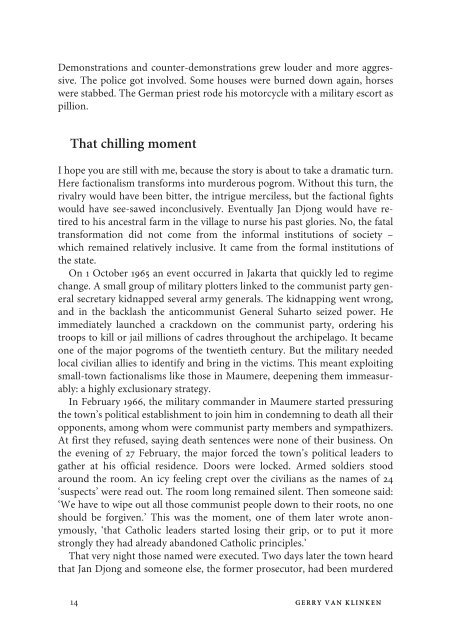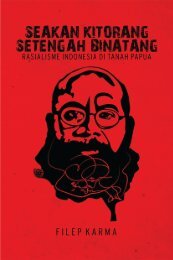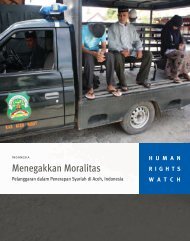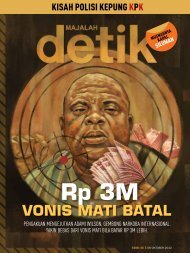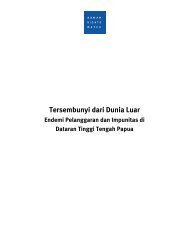Postcolonial Citizenship
PDF-6104Weboratie_Van_Klinken_-_DEF
PDF-6104Weboratie_Van_Klinken_-_DEF
Create successful ePaper yourself
Turn your PDF publications into a flip-book with our unique Google optimized e-Paper software.
Demonstrations and counter-demonstrations grew louder and more aggressive.<br />
The police got involved. Some houses were burned down again, horses<br />
were stabbed. The German priest rode his motorcycle with a military escort as<br />
pillion.<br />
That chilling moment<br />
I hope you are still with me, because the story is about to take a dramatic turn.<br />
Here factionalism transforms into murderous pogrom. Without this turn, the<br />
rivalry would have been bitter, the intrigue merciless, but the factional fights<br />
would have see-sawed inconclusively. Eventually Jan Djong would have retired<br />
to his ancestral farm in the village to nurse his past glories. No, the fatal<br />
transformation did not come from the informal institutions of society –<br />
which remained relatively inclusive. It came from the formal institutions of<br />
the state.<br />
On 1 October 1965 an event occurred in Jakarta that quickly led to regime<br />
change. A small group of military plotters linked to the communist party general<br />
secretary kidnapped several army generals. The kidnapping went wrong,<br />
and in the backlash the anticommunist General Suharto seized power. He<br />
immediately launched a crackdown on the communist party, ordering his<br />
troops to kill or jail millions of cadres throughout the archipelago. It became<br />
one of the major pogroms of the twentieth century. But the military needed<br />
local civilian allies to identify and bring in the victims. This meant exploiting<br />
small-town factionalisms like those in Maumere, deepening them immeasurably:<br />
a highly exclusionary strategy.<br />
In February 1966, the military commander in Maumere started pressuring<br />
the town’s political establishment to join him in condemning to death all their<br />
opponents, among whom were communist party members and sympathizers.<br />
At first they refused, saying death sentences were none of their business. On<br />
the evening of 27 February, the major forced the town’s political leaders to<br />
gather at his official residence. Doors were locked. Armed soldiers stood<br />
around the room. An icy feeling crept over the civilians as the names of 24<br />
‘suspects’ were read out. The room long remained silent. Then someone said:<br />
‘We have to wipe out all those communist people down to their roots, no one<br />
should be forgiven.’ This was the moment, one of them later wrote anonymously,<br />
‘that Catholic leaders started losing their grip, or to put it more<br />
strongly they had already abandoned Catholic principles.’<br />
That very night those named were executed. Two days later the town heard<br />
that Jan Djong and someone else, the former prosecutor, had been murdered<br />
14 GERRYVANKLINKEN


